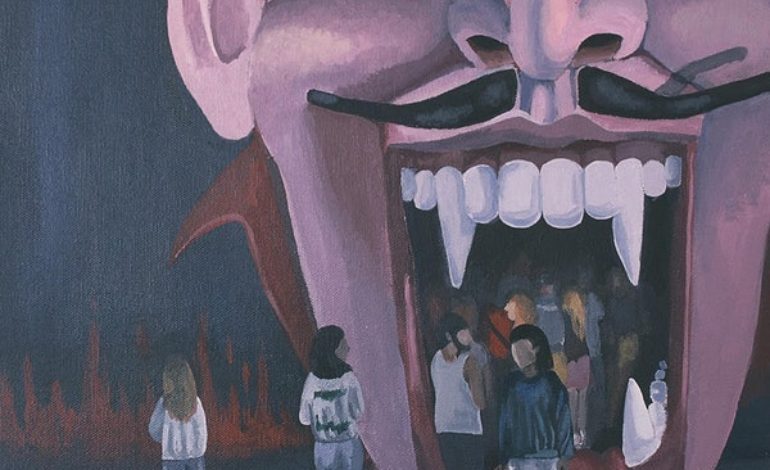

An assemblage of alchemical postmodern indie-pop
They encapsulate modern life in but two words. It begins with one and ends with the other, a sort of start and finish but with no followable trajectory line between, at least, according to their bandcamp page: “ENTERTAINMENT, DEATH doesn’t cohere in a single, unifying theme.” But by sheer juxtaposition of the two colossal concepts, a similarity emerges out of the opalescent cyclone of sound SPIRIT OF THE BEEHIVE conjures in their fourth full-length LP, ENTERTAINMENT, DEATH.
Hailing from Philly, the now-trio’s first self-produced and -mixed album was laboriously recorded via email over the course of a quarter year thanks to the pandemic, and the protracted remote creation turned out a fine-tuned gestation that shines through all its crevices. After recording and mixing the demos in digital, the album was then mastered to tape for an even more texturally diffuse sound.
Despite its supposed themelessness, it can be interpreted as a modern monomyth of a Byronic hero. The first half of opener “ENTERTAINMENT” sonically depicts being pipelined out of the chaos realm through disjointed drums and digital feedback boops into an ordered physics of bird twittering and acoustic strumming: the start of the hero’s journey. Lead singer Zach Schwartz wistfully sings, “I woke up when I heard the blow.” The hero has awoken but to a world already hollowed-out and bleary-eyed by entertainment, and upon realization, inflates into the manic episode of “THERE’S NOTHING YOU CAN’T DO.” It starts off in loutish epiphanies gently sung by Rivka Ravede: “Enough is never enough,” “Spit me out or let me in,” until going berserk to an equally berserk overdriven guitar, Schwartz screaming, “I’M YOUR FRIEND,” uvula visible and shaking furiously, temple veins pulsating, face flushed.
Then there’s a post-storm calm construed by synth and featherlight vocals in “WRONG CIRCLE.” The song’s not totally without its insanity. Its infrastructure is vandalized at random vertices by wormhole distortions. In it, the hero finds community and stability but with a bad lot, and although it affords asylum from his past, its intrinsic wrongness weighs on him. This sentiment suppurates in “BAD SON” and ultimately leads him to ponder, “what have I got me into?” in the trudging, bottom-heavy “GIVE UP YOUR LIFE.”
Then, there’s a renewal, a cinematic reemergence from the narrative’s nadir. The half-ambient, half-jazzy “RAPID & COMPLETE RECOVERY” describes the hero as “spanning lifetimes, compressed in a vacuum,” and though recomposed, is still lost in the ambivalence that caused his downfall: “I don’t know how to find what I have to.”
“THE SERVER IS IMMERSED,” the album’s single, follows with a looping goth guitar and deranged, breathy lyrics as the whole song seems to lurch and undulate throughout. The hero has discovered that he was going in circles: “I was following/ paths I’ve already tried;” and addresses his malevolently misleading inner voice, “No, you don’t have a clue/ but at least I know that I do.”
Things are looking bright and auspicious until the interlude “IT MIGHT TAKE SOME TIME”—repeating its titular phrase over innumerable soundbite switches—may prove to delay the hero’s progress. The cloyingly indie “WAKE UP (IN ROTATION)” zeros in on the hero paralyzed in doubt and self-inquiry, perplexed at “the point of everything.” Then comes the penultimate, four-part “I SUCK THE DEVIL’S COCK,” the longest on the track list. It doesn’t relate to anything about the song at all re its title—other than portraying the dismal archetype of a middle-class American, which is actually pretty approximate to what the title describes—but acts as a catalyst to the final track. The endgame, “DEATH,” doesn’t come as an axe kick to the spinal column—though a couple past moments of the record testify to the band’s potential to do so, and despite the reflex to expect it what with the title meaning the annihilation of life in all-caps aggro. On the contrary, the tune is a tranquil daydream of glistening arpeggios and phased vocals that float and delay like hallucinogen-induced visual tracers. The album’s enigmatic close, the hero’s answer at the journey’s end resounds: “entertainment, death.”
As soon as people try to pinpoint a sound or sensation from ENTERTAINMENT, DEATH, it slips, and another replaces it, and so on. It’s as if it’s alive and in active evasion from comprehension. Don’t trouble yourself even trying; let it wash over you. It’s not meant as one of those albums to dissect, isolate, parse, analyze, compare, taxonomize. No, it injects itself into its subjects and balloons, disorients until a blissed-out state is achieved, one that is maintained by its multifarious shifts that slyly outdo the last in its volatile, blueprint-less gossamer sequence that entertains to death.
